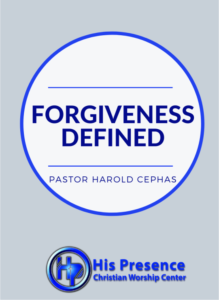Forgiveness Defined

By: Pastor Harold Cephas
In Him we have redemption through His blood, the forgiveness of sins, according to the riches of His grace.
Let’s look at two definitions.
Harper’s Bible Dictionary: a term denoted in the by words that mean ‘send away,’ ‘cover,’ ‘remove,’ and ‘wipe away.
Tyndale’s Bible Dictionary: Pardon, involving restoration of broken relationships; ceasing to feel resentment for wrongs and offenses. Primarily, forgiveness is an act of God, releasing sinners from judgment and freeing them from the divine penalty of their sin. Forgiveness is also a human act extended toward one’s neighbor…
In thinking about forgiveness, it firstly, causes my heart and mind to be thankful. Thankful to Jesus for giving His life in my place (propitiation) for ALL the sins which I have committed in my lifetime. It’s a forgiveness that I still need very much today as long as my body is wrapped with flesh. You are going to need it as well.
I highlighted some items above, but I want to focus on forgiveness which leads to restoration of broken relationships. The original sin (Genesis 3) brought separation between God and man. However, Jesus now brings restoration of that relationship; and you and I are tasked with the same assignment (2 Corinth 5:18-20).
How do we restore relationships with our “neighbor” as mentioned earlier? Well, it’s not always easy for us to operate in this manner. Sometimes we are asked (challenged) to forgive someone multiple times for committing the same offense. The disciples had the very same conversation with Jesus in Luke 17:1-5. Jesus says that it is impossible for there to be no offenses. So, how are we to handle them when they come? If the brother or sister (neighbor) repents (asks for forgiveness), we are to forgive them. Even seven times in the same day! In verse 4 of the ESV it says we “must” forgive them. Matthew 18:21-22 says forgive seventy times seven! Upon hearing this, the apostles said, “Lord, increase our faith!”
Jesus is generous and liberal in forgiving us of all our sins, errors, faults, shortcomings and crazy thoughts. With Him being our example, we should endeavor to do likewise. Especially, for the sake of restoring broken relationships. It’s best if we keep no record or wrongs (1 Co. 13:5). As we go through each day, let’s try and be more deliberate and generous in giving compliments and forgiveness. We can give these any and everywhere, and both are free! However, forgiving may not be our natural response because… So, Lord, increase our faith!
We Need Forgiveness
By Elder Priscilla Martinez
We need forgiveness to live spiritually balanced, hopeful lives. Unforgiveness may affect our health, build up guilt, shame, and regret that may negatively impact one’s physical and mental health. The need for forgiveness is because of original sin of Adam and Eve. Also, there is power to forgiveness, both as it applies to our lives and in its consequences in our relationships with others.
“I, even I, am He who blots out your transgressions for My own sake; And I will not remember your sins.” Isaiah 43:45
Why is it so hard for us to forgive ourselves and others who have hurt us and hold onto old pain from our past finding it so hard to let go? Why do we punish ourselves over and over and those we love for the hurts we’ve endured? Why can’t we let go of the hurt others have inflected on us?
“bearing with one another, and forgiving one another, if anyone has a complaint against another; even as Christ forgave you, so you also must do.” Colossians 3:13
Why can’t we truly forgive and let go without picking it up again? God has forgiven by His son dying on the cross for OUR SINS.
Jesus tells Peter in Matthew 18: 21-22 that we are to forgive up to seventy times seven. The bible never talks about “forgiving yourself.” We are told to forgive others when they hurt us and forgive them. Jesus already paid for all our sins and we are all forgiven. It is as simple as that. However, even though we are released from bondage we still choose to wallow in it and act as though we are not freed from it. We let the enemy hold the guilt card over our head and find it hard to forgive ourselves and can’t move beyond our past. It’s time to let go and let God move you beyond your past to your future.
“If we confess our sins, He is faithful and just to forgive us our sins and to cleanse us from all unrighteousness.” 1 John 1:9

Hope

Hope

He Is Love


True Worship


Faithfulness

